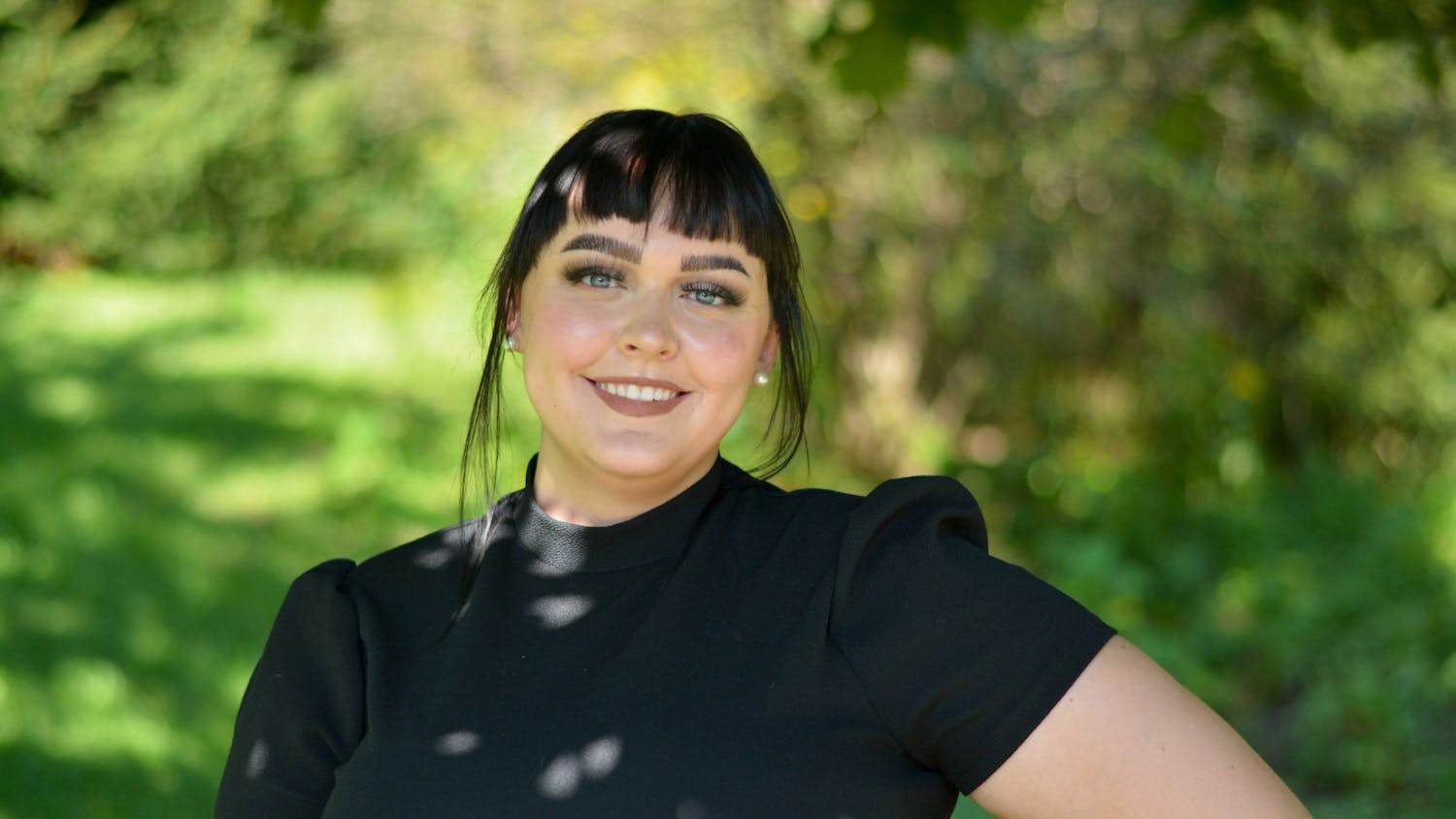Trigger warning: the following article discusses eating disorders and disordered eating.
According to the National Eating Disorder Association, or NEDA, approximately 30 million people will experience an eating disorder at some point in their lifetime in the U.S. alone, including many college students.
NEDA describes eating disorders as complex illnesses that affect people regardless of age, gender, race, size or body shape. These illnesses are serious but treatable. While anyone can develop an eating disorder, college can be a particularly difficult time. In an interview with healthline, Claire Mysko, head of NEDA, said, “College is a period of development in which disordered eating is likely to arise, resurface, or worsen for many young men and women.”
For many Ohio University students with an eating disorder, or in recovery from one, the upcoming holiday season can be triggering, especially as holidays such as Thanksgiving and Christmas tend to focus primarily on food.
“Conversations that can be triggering from a holiday perspective, like Thanksgiving and Christmas especially, revolve a lot around food,” Jessica Arquette, an assistant professor of instruction of food and nutrition sciences and a registered and licensed dietician said. “Sometimes, just focusing on the food can make things harder because the person is already struggling with thoughts about food, and making the days all about food can be particularly stressful.”
Looking back on her past experience with an eating disorder, Riley Hess, a sophomore studying communications, said the holidays made enjoying her surroundings much harder.
“I’d say the holidays are a really hard time,” Hess said. “Thanksgiving was the worst holiday of the year for me because my family would be like, ‘You know, you have to eat a full meal,’ and it freaked me out.”
While the holidays can propose a challenge for students experiencing or recovering from eating disorders, there’s also a multitude of ways to prevent disordered eating habits from resurfacing.
“Sometimes, I'll take a warm shower just to relax a little bit,” Mayson Chapnick, a sophomore studying child and family studies, said. “I like to watch the (Macy’s) Thanksgiving Day Parade, that's a tradition in my family, so that's always just really relaxing and just being around people I really love.”
Meanwhile, Hess finds comfort in practicing self-care, especially as temperatures drop and snow begins to fall.
“Obviously, I still have my triggers, but I focus on the good,” Hess said. “I’d go by comfy socks, I’d do a lot of self-care with skincare. I’d go buy Thanksgiving or Christmas pajamas, I’d go outside if there was snow out, (I drank) hot chocolate or (did) things that made me happy, so then when those stressful times did come up, I felt a little more calm.”
Yet, what’s important to remember about the holidays is that some individuals may want or need support, whether it be from family or friends. Arquette has consulted with a psychotherapist who specializes in disordered eating, specifically in adolescents and teenagers, and suggests checking in with the person who may face additional difficulties for the day.
“Family and friends can ask the person how they can offer support,” Arquette said. “How would that person who's struggling like to receive the support? Do they want a text message several times throughout the day? Do they want reminders? Do they want a hug? Do they not want a hug? Do they want invitations? Do they want to be in charge of traditions? Do they want to take walks? Just being considerate of what the person who's struggling is going to find most helpful and respecting that.”
Chapnick also said that finding enjoyment during the holidays is crucial, as your body still needs nourishment and attention.
“You have to think you're nourishing your body, and it's hard but you're going to want to eat every single meal, even if your mind is telling you not to, because overall your body needs it,” Chapnick said.
Arquette says that treating Thanksgiving or Christmas as a normal day of eating can also provide students with a sense of relief during the holidays.
“On holiday meals, such as Thanksgiving, try not to only eat one huge meal and save up for that meal and over indulge and then feel bad and not eat anything for the rest of the day,” Arquette said. “Try to have the normalized eating patterns that you would on most other days.”
Hess said she would ensure her meal was full of comfort foods to help her on food stressful holidays. She said she does not always favor turkey or mashed potatoes, so she swapped them out for ham and macaroni and cheese.
“In my mind, as I started to recover, one thing that I really focused on was foods I liked,” Hess said. “I didn't force myself to eat anything I didn't like. I told my family ‘Look, I'm going to eat a whole meal. It's going to be the things I like. That's how I'm going to start,’ and so they were like, ‘Okay, well, as long as you eat a full meal, we'll let you pick and choose.’”
Additionally, Hess says that not fixating on calorie intake or the food itself, but on the people around you is another way to avoid triggers.
“Thinking about it not as much about food, but thinking about it in the other senses of the holiday,” Hess said. “For Thanksgiving, I try to not let myself think of it as something where I'd have to eat food, but something where I got to see my family and where I get to talk to people I haven’t seen in years.”
Achieving a sense of perfectionism is another factor that affects students with eating disorders during this time. Of course, perfectionism is not something that exists, but holding oneself to the standard of “perfectionism” is a frequent symptom of those who navigate eating disorders or disordered eating. Arquette says being mindful of this tendency can help release stress at home.
“Not listen to all the messages that we might be receiving about how perfect the holidays have to be, and to also not expect perfectionism from yourself, or from your family members who are just trying to do their best to love you and care for you,” Arquette said. “Release the pressure off of yourself and everyone else.”
It is difficult to work through patterns and expectations, especially those that have become ingrained, so it can be helpful to turn to others when possible. On the flip side, looking out for others during this time is necessary, as many students who have not voiced their eating struggles to others can be wary about doing so.
“I heard from someone very close to me who still struggles with an eating disorder,” Arquette said. “Her advice to people was if you see warning signs in someone, or you notice that someone is struggling, don't be afraid to speak up to that person so that they know that someone has seen them.”
Even if in recovery for an eating disorder, Chapnick says students should still lean on others to remind them that they are not alone.
“It's going to be hard, especially when you're in recovery, or you don't want to be in recovery, but you have to think about you're going to be around people you love most likely, and they're going to help you get through this hard time,” Chapnick said.
Above all, students who have an eating disorder, are in recovery from one or need help should seek the advice of a medical and psychological professional.
“It is important for anyone who's struggling with disordered eating, or has been diagnosed and trying to recover from an eating disorder, to be under medical supervision and having assistance with psychological counseling of some sort,” Arquette said.
Recovery is achievable. If you are in need of help with an eating disorder, the following resources are available:
- Ohio University Counseling and Psychological Services, or CPS: (740) 593-1616
- National Eating Disorders Association, or NEDA helpline, which one can call or text: 1-800-931-2237
- The Center for Balanced Living Columbus: 888-364-5977
- The Emily Program: 1-888-364-5977
- Eating Recovery Center: 1-866-488-1863






